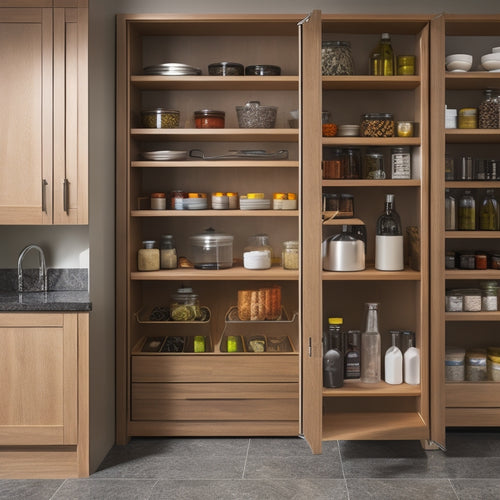
San Mateo County Health's Exciting Food Updates
Share
San Mateo County Health is revolutionizing the food scene with innovative updates, including the shift to an online portal, implementation of the Disposable Food Service Ware Ordinance, and mandated food recovery agreements, all aimed at promoting a safe and sustainable food system. These updates also include new permits and applications for food businesses, such as Microenterprise Home Kitchen Operations and Cottage Food Operations. Moreover, home-based food entrepreneurs can now capitalize on new opportunities under Assembly Bill 626. For a closer look at the specific initiatives and requirements, explore how San Mateo County Health is shaping the future of food safety and innovation.
Key Takeaways
• San Mateo County Health's Food Program is transitioning to an online portal in 2024 for enhanced efficiency and convenience.
• A Disposable Food Service Ware Ordinance will ban single-use plastics, promoting sustainability in the food industry.
• Large food entities must establish food recovery agreements in compliance with state law SB 1383, reducing food waste.
• The county is promoting a safe and sustainable food system through enhanced permit requirements and guidelines for food businesses.
• Home-based food entrepreneurs can capitalize on business opportunities under Assembly Bill 626, with proper permits and compliance.
Food Program Updates and Requirements
San Mateo County Health's Food Program is undergoing significant updates and implementing new requirements to guarantee a safe and healthy food environment for the community. The program is enhancing its services by moving to an online portal in 2024, ensuring a more efficient and streamlined experience for food facility operators.
In addition, the program is enforcing environmental regulations, such as the Disposable Food Service Ware Ordinance, which prohibits the use of single-use plastics. Moreover, large food entities are now required to have food recovery agreements in compliance with state law SB 1383.
These food program enhancements and environmental regulations aim to promote a safe and sustainable food system in San Mateo County.
Applications and Permits Available
To support the growth and development of food businesses in San Mateo County, various applications and permits are available to facilitate compliance with health and safety regulations.
The application process includes permit requirements for new food businesses, plan checks, ownership changes, and tobacco sales permits. Market category options are also available, including Market Risk Category 1 and 2, Market Coordinator, and guidelines for each.
Additionally, specific guidelines and permits are required for Microenterprise Home Kitchen Operations and Cottage Food Operations.
Home-Based Food Business Opportunities
Under California's Assembly Bill 626, entrepreneurs can now capitalize on home-based food business opportunities, leveraging their culinary skills to generate income while ensuring compliance with health and safety regulations.
This legislation enables home kitchen innovation, allowing individuals to monetize their cooking talents and explore market opportunities. Through the Microenterprise Home Kitchen Operations (MEHKO) program, home kitchens can be used for retail purposes, promoting entrepreneurship and community engagement.
With proper permits and compliance, home-based food businesses can thrive, providing a unique platform for culinary innovation and economic growth. By embracing this initiative, San Mateo County Health supports the development of a vibrant food scene, driving local economic growth and enriching community life.
Frequently Asked Questions
What Is the Deadline for Transitioning to the Online Portal in 2024?
The deadline for Environmental Health Services' shift to an online portal is set for 2024, ensuring seamless compliance with food safety regulations and streamlining processes for food facilities, operators, and regulators alike.
Can I Operate a Food Business From My Residential Address?
Operating a food business from a residential address requires compliance with local zoning regulations and specific permits. Home-based operations, such as MEHKO or Cottage Food Operations, have distinct guidelines and application processes to guarantee public health and safety.
Are There Exemptions From the Disposable Food Service Ware Ordinance?
Regarding exemptions from the Disposable Food Service Ware Ordinance, establishments may be exempt if they meet specific exemption criteria, such as serving a limited number of customers or having limited operational hours, although implementation challenges may arise.
How Often Do I Need to Renew My Food Facility Permit?
Food facility permits typically require annual renewal, ensuring ongoing compliance with health codes and regulations. Permit holders must submit renewal applications and applicable fees by the designated deadline to maintain operational compliance.
Do I Need a Permit to Host Temporary Food Events?
To host temporary food events, permit requirements vary depending on event type and location. Guarantee compliance with event regulations by obtaining necessary permits, such as temporary food facility permits, and adhering to health and safety guidelines.
Related Posts
-

Space-Saving Lazy Susan Cabinet Solutions
Space-saving Lazy Susan cabinet solutions can change those awkward corner spaces into organized storage wonders. You'...
-

Roll-Out Trays for Organizing Baking Supplies
Roll-out trays are perfect for organizing your baking supplies, making your kitchen more efficient. They maximize spa...
-

Spice Rack With Integrated Herb Garden
A spice rack with an integrated herb garden alters your kitchen into a culinary haven. You'll have fresh herbs at you...


